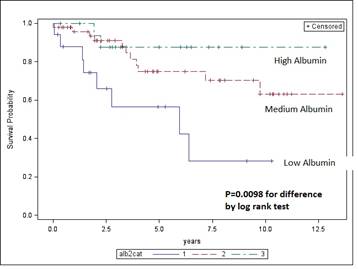Session Information
Date: Sunday, October 21, 2018
Title: Systemic Lupus Erythematosus – Clinical Poster I: Clinical Manifestations and Comorbidity
Session Type: ACR Poster Session A
Session Time: 9:00AM-11:00AM
Background/Purpose: Lupus nephritis remains a major cause of morbidity/mortality in SLE. Our cohort has shown that 20% of SLE patients with lupus nephritis onset in the first year will have end-stage renal disease (ESRD) by year ten. Population studies have shown no improvement in lupus nephritis outcomes in the last decades. Clinical trials of lupus nephritis cannot address long-term renal outcomes. We addressed whether serum albumin at 12 months after renal biopsy predicted long-term renal outcome.
Methods: 87 patients with biopsy-proven lupus nephritis were included in the analyses. Of the 87 patients, 79 (91%) were female, 49 (56%) were African American, 24 (28%) were Caucasian, and 14 (16%) were “other”. At the time of biopsy, 33 (38%) were under 30 years of age, 38 (44%) were from 30-44, and 16 were 45 years of age or older. The median age was 32.9. The median values of albumin at biopsy and 1-year post were 3.7 and 3.9 respectively. ISN/IRP class was 24% III, 23% IV, 23% V, and 30% mixed. Albumin levels were classified as low (<3.4g/dL), medium (3.5-4.3g/dL) and high (>4.3g/dL). Kaplan-Meir curves were plotted to assess the association between albumin levels and risk of developing renal event. Renal outcomes were 1 ESRD, 6 renal insufficiency, and 14 doubling creatinine.
Results: Serum albumin at 12 months post renal biopsy was associated with poor renal outcomes during follow-up (p = 0.0098). Among those with low serum albumin one year after biopsy, an estimated 43% will progress to renal failure, renal insufficiency, or a doubling of creatinine within 5 years (95% confidence interval 16%-71%). In contrast, among those with high serum albumin, an estimated 13% will progress (95% CI 1%-29%).
Figure 1: Plot of the probability of remaining renal-event free, by albumin levels one year after biopsy
Conclusion: Serum albumin 12 months post biopsy predicted good renal outcome in a linear fashion. This surrogate for renal outcome is readily available from lupus nephritis randomized clinical trials (and from some large databases, as well). Serum albumin should be added to urine protein/cr as validated surrogates for long-term renal outcome in lupus nephritis.
To cite this abstract in AMA style:
Domingues V, Goldman D, Magder LS, Petri M. Serum Albumin at One Year Predicts Long-Term Renal Outcome [abstract]. Arthritis Rheumatol. 2018; 70 (suppl 9). https://acrabstracts.org/abstract/serum-albumin-at-one-year-predicts-long-term-renal-outcome/. Accessed .« Back to 2018 ACR/ARHP Annual Meeting
ACR Meeting Abstracts - https://acrabstracts.org/abstract/serum-albumin-at-one-year-predicts-long-term-renal-outcome/

